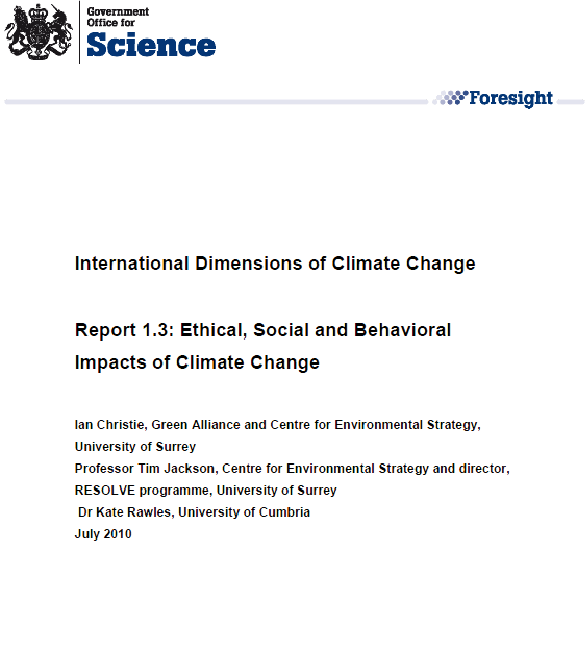Aubrey
I'm happy to support C&C, as ever.
Tim
Tim Jackson
Professor of Sustainable Development
University of Surrey
Director of the ESRC Research Group on Lifestyles, Values and Environment (RESOLVE)

"Contraction and Convergence (C&C) refers to an approach originally proposed by the Global Commons Institute (GCI) but now widely agreed to represent a fair and meaningful way of achieving stabilization targets. Overall emissions 'contract’ to a level compatible with the stabilization target, and per capita emissions 'converge' towards an equal per capita shares of the overall emissions budget. Very simply, C&C is a way of transparently structuring future negotiations on the understanding that prosperity is governed by ecological limits on the one hand and fair shares on the other." For more information on the approach see for example Meyer 2004, See also briefings by the Global Commons Institute, online here and here
Prosperity Without Growth: Economics for a Finite Planet
Tim Jackson
Establishing ecological limits
The material profligacy of consumer society is depleting key natural resources and placing un-sustainable burdens on the planet’s ecosystems. Establishing clear resource and environmental limits and integrating these limits into both economic structure and social functioning is essential. This means paying a much closer attention to the ecological limits of economic activity. Identifying clear resource and emission caps and establishing reduction targets under those caps is vital for a green economy. To the extent that they have been implemented, the stabilization targets and emission budgets established for carbon provide an exemplar here (IPCC, 2007; CCC, 2010). The conditions of equity and ecological limits, taken together, suggest a key role for the model known as “contraction and convergence” in which equal per capita allowances are established under an ecological cap that converges towards a sustainable level (Meyer 2004). This approach has been applied, to some extent, for carbon. Similar caps should be established for the extraction of scarce non-renewable resources, for the emission of wastes (particularly toxic and hazardous wastes), for the drawing down of “fossil” groundwater sources and for the rate of harvesting of renewable resources. Effective mechanisms for achieving targets under these caps need to be set in place. Once established, these limits also need to be integrated into a convincing economic framework.
Societal transformations for a sustainable economy - Tim Jackson
Natural Resources ForumImplications of systematic caps on natural resources
A lasting prosperity requires a much closer attention to the ecological limits of economic activity. Identifying and imposing strict resource and emission caps is vital for a sustainable economy.
The contraction and convergence model developed for climate- related emissions should be applied more generally. Declining caps on throughput should be established for all non-renewable resources. Sustainable yields should be identified for renewable resources.
Limits should be established for per capita emissions and wastes. Effective mechanisms for imposing caps on these material flows should be set in place. Once established, these limits need to be built into the macro-economic frameworks.
Building a Sustainable and Desirable Economy-in-Society-in-Nature
Robert Costanza
Ida Kubiszewski
Carol Franco
Institute for Sustainable Solutions,
Portland State UniversityGar Alperovitz
The Democracy Collaborative and Department of Government and Politics,
University of MarylandHerman Daly
School of Public Affairs,
University of MarylandJoshua Farley
Department of Community Development and Applied Economics,
and Gund Institute for Ecological Economics,
University of VermontTim Jackson
Sustainable Lifestyles Research Group,
University of Surrey, UKJuliet Schor
Department of Sociology,
Boston CollegePeter Victor
Faculty of Environmental Studies,
York University, CanadaRonald Colman
Genuine Progress Index Atlantic,
Nova Scotia, Canada
Context Analysis - Ethics and international climate policy
The recent UN conference on climate policy at Copenhagen highlighted fundamental problems in the framing of climate policy debates and in the integration of ethical, social and behavioural factors in the development of policy:
- Explicit normative framings of the issues at stake were presented by various groups - such as the alliance of small island states, and the numerous NGO campaigners meeting alongside the Conference of the Parties. These positions emphasised arguments that assign ethical responsibility primarily to the industrialised countries to take urgent action for mitigation, assistance in adaptation to developing countries, and so on;
- The Kyoto framework assumes and includes an ethical stance in which primary responsibility for emissions reduction falls on the industrialised countries, via the policy of common but ‘differentiated’ responsibilities among nations;
- Alternative frameworks proposed for mitigation - such as Contraction and Convergence (Meyer, 2000) - also represent distinctive ethical stances, emphasising the need for and right to increased energy use for development for the poor world, with attendant demands for change in industrial world consumption patterns as a matter of perceived social and ecological justice;
- The complex ethical dimensions of climate change mitigation and adaptation, in particular those relating to contested ideas of justice and responsibility, were not highlighted in the Copenhagen conference’s final outputs. Nevertheless, positions that are unarguably ethical in the neutral descriptive sense - and often problematic – were present throughout the negotiation in multiple contexts;
"As a principle C&C is almost incontravertible."
Professor Tim Jackson at COP-15 2009
Back to UNFCCC Submission Back to Signatory List






